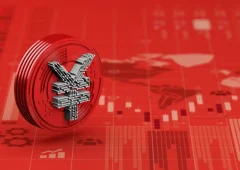Bolivia’s New President Taps Blockchain to Fight Corruption
20.10.2025 20:00 2 min. read Alexander Zdravkov
Bolivia’s incoming president, Rodrigo Paz, aims to use blockchain technology to tackle government corruption and modernize public finances.
Paz, who won the runoff election with 54.5% of the vote against Jorge Quiroga, will take office on November 8, inheriting an economy strained by fuel shortages and a tight US dollar supply.
Two key initiatives highlight his approach to digital assets. First, Paz plans to implement blockchain and smart contracts in public procurement to reduce discretionary decision-making, automating portions of state purchasing and making processes more transparent. Second, his administration will allow citizens to declare cryptocurrency holdings as part of a new foreign-exchange stabilization fund, designed to broaden reserve assets and strengthen the national currency.
While Paz sees blockchain as a tool for transparency, he is not pushing for national adoption of Bitcoin or other cryptocurrencies for reserves or retail use.
The focus is pragmatic: use digital assets for anti-corruption measures and one-time asset regularization to support currency stability.
Bolivia has been gradually opening up to crypto since 2024. The central bank lifted restrictions on digital transactions last year, enabling regulated crypto payments and doubling average monthly trading volumes. Institutional custody of USDT has begun, and major merchants- including Toyota, Yamaha, and BYD – are accepting stablecoins. The central bank also signed a cooperation memorandum with El Salvador to explore crypto as a viable alternative to fiat, reflecting a broader trend toward modernization and financial inclusion.
-
1
BNY Mellon Explores Tokenized Deposits to Enable Blockchain-Based Payments
07.10.2025 17:00 2 min. read -
2
Europe’s Tokenization Boom: Robinhood Leads the Charge
19.10.2025 20:00 1 min. read -
3
New Interoperability Platform Enso Launches to Link 1,000+ Blockchains
14.10.2025 15:18 1 min. read -
4
BNB’s 2000% Fee Drop Redefines Blockchain Efficiency
11.10.2025 11:00 1 min. read -
5
Solana’s Network Handles Heavy Demand Without Performance Loss
11.10.2025 18:00 1 min. read
Coinbase CEO Confident US Senators Will Finalize Crypto Rules Soon
Coinbase CEO Brian Armstrong says momentum is building in Washington for long-awaited cryptocurrency market structure reform, even as the US government remains shut down.
Revolut Gets Green Light in Europe – Millions of Crypto Users Set to Benefit
Revolut is taking a major step into the European crypto market after securing regulatory approval in Cyprus, giving it the green light to operate across all 30 countries in the European Economic Area.
EU Targets Russian Crypto Lifeline With Sweeping New Sanctions
The European Union has rolled out its 19th sanctions package against Russia, this time taking aim at the country’s growing use of digital assets to sidestep financial restrictions.
Crypto Executives Confront Angry Senators as Regulation Talks Turn Chaotic
Efforts to bring digital asset regulation to Capitol Hill reached a breaking point this week when top crypto executives met with Senate Democrats in a closed-door session marked by frustration and political finger-pointing.
-
1
BNY Mellon Explores Tokenized Deposits to Enable Blockchain-Based Payments
07.10.2025 17:00 2 min. read -
2
Europe’s Tokenization Boom: Robinhood Leads the Charge
19.10.2025 20:00 1 min. read -
3
New Interoperability Platform Enso Launches to Link 1,000+ Blockchains
14.10.2025 15:18 1 min. read -
4
BNB’s 2000% Fee Drop Redefines Blockchain Efficiency
11.10.2025 11:00 1 min. read -
5
Solana’s Network Handles Heavy Demand Without Performance Loss
11.10.2025 18:00 1 min. read
Matt Hogan, Chief Investment Officer at Bitwise Asset Management, anticipates a significant rise in Ethereum's price following the launch of Ethereum ETFs.
Despite recent market-wide downturns and the impacts on crypto investors, certain projects keep making the headlines with stunning growth and impressive prospects.
Analysts are speculating Bonk's price is on track to break its all-time high of $0.00005825, which it set in November last year, although its failed to deliver bullish momentum as yet.
The Solana-based memecoin BONK has been making waves with a remarkable 16% price surge in the past 24 hours, setting new milestones in the memecoin space.
BONK’s recent struggles have left investors searching for new opportunities and many are finding exactly that in Panshibi (SHIBI).
Panshibi's impressive development has attracted Bonk crypto holders who are scrambling to secure a spot in its presale before it goes live.
Bonk Inu (BONK), a popular meme coin built on the Solana blockchain, has made a significant leap in the global cryptocurrency space.
The meme coin market has typically been a battlefield of hype and sentiment.
Solana’s meme coin, BONK, has surged by 200% in the past two weeks, hitting a market cap close to $3.7 billion.
The founder of Floor Protocol, operating under the alias FreeLunchCapital, has attracted attention after purchasing a Non-Fungible Token (NFT) linked to the Bored Ape Yacht Club (BAYC) for 588 ETH, equating to approximately $1.43 million.
Brad Garlinghouse has flatly denied that Ripple ever attempted to acquire Circle, the company behind the USDC stablecoin, shutting down weeks of speculation about a potential $5 billion deal.
Brazil is making strides in the crypto sector with the approval of its first spot XRP exchange-traded fund (ETF).
Talks of a unified BRICS currency capable of challenging the U.S. dollar have hit a stark reality check. Brazil’s central bank has made it clear: there simply isn’t enough financial firepower within the bloc to support such an ambitious move.
Brazil is moving toward a shift in how employees can be compensated, with new legislation proposing the use of cryptocurrencies like Bitcoin for wage payments.
Brazil has just joined the list of countries where public companies are embracing Bitcoin as a long-term financial strategy.
Brazil’s Chamber of Deputies Economic Development Commission is set to hold its first public hearing on August 20 to evaluate a proposal for a Bitcoin Strategic Reserve (RESBit) valued at up to $18.6 billion.
The Central Bank of Brazil has been developing its digital real project over the past several years.
The Central Bank of Brazil (BCB) has partnered with leading tech companies like Chainlink, Microsoft, and Banco Inter to further develop DREX, the country’s central bank digital currency (CBDC).


